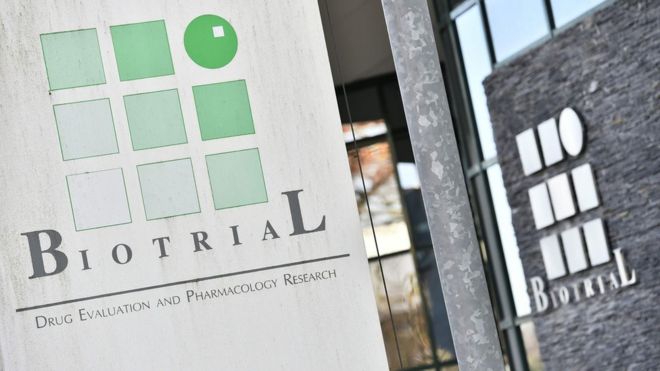source:
http://www.bbc.com/news/world-europe-35337671France drug trial: Brain-dead man dies in hospital Biotrial has carried out thousands of trials since it was set up in 1989
Biotrial has carried out thousands of trials since it was set up in 1989A man left brain-dead after an experimental drug trial in France has died, local media report.
He was one of six people being treated in hospital in the city of Rennes.
The other five remain in a stable condition, the hospital said, four had "neurological problems", the fifth had no symptoms.
Reports that the drug was a cannabis-based painkiller have been denied by the French health ministry. The Paris prosecutor has opened an investigation.
The trial, which involved taking the drug orally and has now been suspended, was conducted by a private laboratory in Rennes.
Ninety volunteers took the drug, manufactured by the Portuguese company Bial.
Ten of the other 84 have been tested, but did not display any of the "anomalies" of those admitted, the Rennes hospital said in its statement (in French).
On Friday, the chief neuroscientist at the hospital, Gilles Edan, said there was no known antidote to the drug.
Analysis: James Gallagher, health editor, BBC News website
This is the bitter price of the new medicines we take for granted. Testing such experimental drugs, at the cutting edge of science, can never be completely risk-free.
The safety and effectiveness of these drugs are rigorously tested in animals. The risks are low but there must still be a leap of faith when they are tried in people for the first time.
This trial has been taking place since July without such major events being reported. Generally in Phase I trials the dose is increased slowly over time, which could be why the side-effects are appearing now.
The hospitalised men started taking the drug regularly on 7 January and began showing severe side-effects three days later.
It is a high price to pay, but thousands of people do safely take part in similar trials each year.
The trial was conducted by Biotrial, a French-based company with an international reputation which has carried out thousands of trials since it was set up in 1989.
The study was a Phase I clinical trial, in which healthy volunteers take the medication to evaluate the safety of its use, the ministry said.
Before any new medicine can be given to patients, detailed information about how it works and how safe it is must be collected.
Clinical trials are the key to getting that data - and without volunteers to take part in the trials, there would be no new treatments for serious diseases such as cancer, multiple sclerosis and arthritis.
New EU regulations to speed up clinical drug trials and streamline testing procedures across the 28-nation bloc are due to take effect in 2018.
Clinical trialsTrials typically have three phases to assess a new medicine for safety and effectiveness:
Phase I tests for safety. A small number of people, sometimes healthy, and sometimes with a medical condition, are given a tiny dose of the drug under careful supervision, not to test if the drug works, but in order to check for any side effects
Phase II sees the drug given to people who have a medical condition to see if it does indeed help them
Phase III trials are only for medicines or devices that have already passed the first two stages, and involve them being compared to existing treatments or a placebo. The trials often last a year or more, involving several thousand patients
continues at http://www.bbc.com/news/world-europe-35337671






